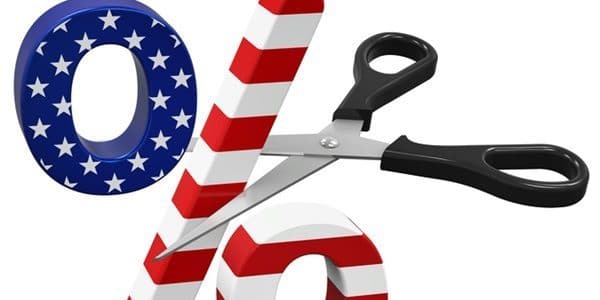Written by Taylor Financial Group, LLC
Wednesday, July 31st was a big day. The Federal Reserve cut interest rates (by 25 basis points (0.25%)) for the first time since it battled the financial crisis in 2008. To put this in perspective, the last time the Fed cut rates, the Dow Jones Industrial Average was a third of what it is today, and Instagram was not yet invented.
The Federal Reserve’s rationale in cutting rates is important to the markets. However, investors will also want to consider new data on GDP growth, inflation and corporate earnings. Markets will also be impacted by changes in the global environment including on-going trade tensions and the state of Brexit negotiations with the new British Prime Minister.
This past week, our team sat in on a call from Dr. David Kelly, Chief Global Strategist at JP Morgan Chase. He talked about the Federal Reserve, the rate cut, and its possible consequences on client portfolios. Read on to find out his outlook for the rest of the year.
Rate Cuts & Consequences?
Dr. Kelly started off the call with an example. His wife makes him M&M cookies whenever he comes home from a business trip. He asks the listeners, “can you stop at eating just one? Two? Will you keep going until the plate is empty?” In other words, he thinks that it is going to be hard for the Fed to stop at this one rate cut. This could turn into a never-ending cycle, leading to a weaker dollar, and a possible stall (not just slowdown) of US economic growth.
Equity Markets Update
Dr. Kelly believes that sectors such as financials, healthcare, real estate, and utilities have not posted much in the way of organic earnings. Most of their quarter to quarter growth has been due to stock buybacks. JP Morgan Asset Management projects 2019 earnings growth to finish between 4-5%. Analyst estimates for 2020 are a bit higher at 10-11%, but there are risks building to the downside. Dr. Kelly made a remark that this earnings season is “okay” so far and thinks it will continue to grow going forward.
Outside of the US markets, there is a weakness in manufacturing and lower commodity prices within the emerging markets. Emerging markets are tracking a 1.5% year over year decline in growth due to energy and materials, and the decline in commodity prices and uncertainty revolving around trade tensions. The same could be said for countries such as Japan, France, and Germany in terms of slowdown in part to manufacturing and trade tensions.
None of this means that international equity is a bad investment, however. In fact, Dr. Kelly compares international equity to private equity in that you often lose money within the first few years, and then start to see the positive return a few years down the road. Essentially, JP Morgan sees long-term payout potential when it comes to international equity.
A Slowdown Is Not A Stall
The economic growth in the 2nd quarter was 2.1%. This is a pretty good number for a quarter in terms of overall GDP, according to Dr. Kelly. Year over year, the growth is 3.2%, but has been slowing ever since the start of the year. Economic slowdown is no longer a forecast, it’s a fact. However, a slowdown is far superior to a stall.
As of July 31st, services are doing much better than manufacturing. In fact, there is a further slowdown in manufacturing PMI as it stands at 49.1, which is its lowest number since 2012. The 6 ½ year low for manufacturing does not bode well for the US economy, and certainly confirms economic slowdown.
Dr. Kelly’s Forecast
Barring some other shock, Dr. Kelly sees the economy continuing growth into “next year, the year after that, and the year after that.” Obviously, that is a very good sign. His reasoning is that there is no “booming” tech sector, no bubble housing market, and no overly tight monetary policy. He projects a 1.6% quarter to quarter growth, with a 2.0% growth year over year.
Fed Chairman, Jerome Powell, is looking for 2% inflation for the year. The unresolved trade tensions between the US and China, Europe, and Asia are not a good sign. These tensions will very likely continue into 2020. Dr. Kelly notes that it is not Powell’s job to talk about appropriate trade policy, but it is slowing the US economy and hurting the overall outlook going into next year.
Powell said that he saw this interest rate cut as a mid-cycle correction, rather than a long series of rate cuts. Like mentioned before, Dr. Kelly notes that this will be a hard idea to follow through on. It is not easy to take just one cookie, and it it will also not be easy to cut rates just one time.
Will there be another rate cut this year? Let us hear your thoughts on Social Media!
Have a question about retirement planning in Allendale, NJ?
Click here to schedule your complimentary 20 minute phone consultation!
Taylor Financial Group, LLC
795 Franklin Avenue
Bldg. C, Suite 202
Franklin Lakes, NJ 07417
Securities offered through Cetera Advisor Networks LLC, Member FINRA/SIPC. Investment advisory services offered through CWM, LLC, an SEC Registered Investment Advisor. Cetera Advisor Networks LLC is under separate ownership from any other named entity. The views stated in this piece are not necessarily the opinion of the Broker/Dealer and should not be construed directly or indirectly as an offer to buy or sell any securities mentioned herein. Due to volatility within the markets mentioned, opinions are subject to change with notice. Information is based on sources believed to be reliable; however, their accuracy or completeness cannot be guaranteed. Past performance does not guarantee future results
JP Morgan Asset Management Market Insights “Rate Cuts and Consequences” Call


